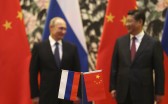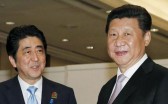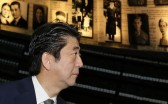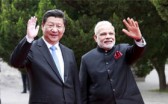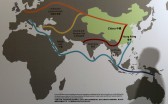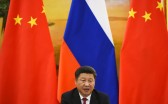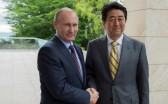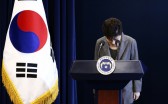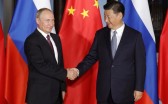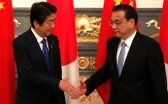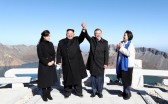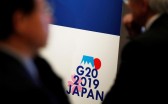Future Prospects for Japan-China Cooperation
This year marks the 40th anniversary of the Japan-China Treaty of Peace and Friendship. Over these four decades, Japan-China relations have gone through a number of ups and downs as history and territorial issues have at times hindered political relations while economic interdependence has deepened.
Recently, Japan-China relations appear to be on a positive uptick. Premier Li Keqiang visited Japan in May for the first Japan-China-South Korea trilateral summit in three years. Li and Prime Minister Abe Shinzo also held a bilateral summit, where they agreed on a number of projects for positive cooperation. This included strengthening financial cooperation, such as China establishing a RMB200 billion (USD31.4 billion) quota for Japanese investors under its Renminbi Qualified Foreign Institutional Investor program, and moves to revive currency swap arrangements in order to provide each other with funds in case of a financial crisis. Infrastructure cooperation was on the agenda with the creation of a public-private forum for government and business leaders to promote joint infrastructure exports to third countries through China’s Belt and Road Initiative. In the security sphere, it was agreed that a communications mechanism to prevent and manage military-related sea and air incidents in the East China Sea should be quickly implemented. While areas of disagreement relating to history issues and the Senkaku Islands still lurk in the background, they appear to have been put to the side in order to concentrate on cooperation and President Xi Jinping is slated to visit Japan for a bilateral summit in 2019.
But what are the prospects for Japan and China to maximize this positive momentum and further build substantive cooperation into the future? This will most likely depend on three key factors. First, to what extent can Japanese and Chinese leaders articulate a persuasive vision of shared interests? Second, how will Japan and China manage the uncertainty surrounding their respective relationships with the United States? Third, how will the two countries seek to advance their interests on the Korean Peninsula as new developments unfold in North Korean denuclearization negotiations following the historic first-ever US-DPRK summit meeting?
Articulating Shared Bilateral Interests
In order to best utilize the current positive momentum and deepen Japan-China cooperation, political leadership is needed in both countries to articulate and implement a shared vision for the future of the two nations as well as the role they will play in promoting regional stability and prosperity. This vision must identify areas of shared interest for mutual cooperation and take on the task of persuading domestic audiences that cooperation is the key to a better future for both countries.
Japan and China are already highly economically interdependent given their geographical proximity and their respective status as the third and second largest economies in the world. Japan-China trade relations are the third biggest two-way bilateral relationship in the world (after US-Canada and US-China), and China has long overtaken the United States as Japan’s biggest trading partner. In 1990, China accounted for just six percent of Japanese trade, and the United States accounted for 30 percent. By contrast, in 2017, China accounted for 22 percent of Japanese trade while the United States accounted for 15 percent. This Japan-China economic interdependence is only likely to intensify in the future as China’s economy continues to grow. As Japan continues to seek to revitalize its long-term economic growth, and as the Chinese Communist Party’s domestic political legitimacy continues to be underpinned by economic growth (of around six percent under the new normal), it is in the interests of both countries to maintain strong economic cooperation.
Xi Jinping has set 2049, the 100th anniversary of the founding of the People’s Republic of China, as the target year for the “great rejuvenation” of the Chinese nation and the establishment of China as a modern and prosperous socialist society. Achieving developed nation status, however, will require China to address enormous challenges with the potential to undermine sustainable economic growth. As an economically advanced nation, which has faced such development challenges, Japan is uniquely positioned to assist China in this endeavor. This should include forging cooperation on the environment, energy security, technology development, industrial relations, and city-planning.
At the same time, serious concerns are mounting regarding the way in which China is pushing its rise centered on Chinese nationalism. Xi Jinping continues to use the “Chinese Dream” as the leading concept in promoting Chinese nation-building efforts. Therefore, Japan has no real alternative but to deepen its alliance with the United States in order to deter China from becoming a regional hegemon. Furthermore, in order to avoid excessively burdening the United States, Japan must expand its own defense capabilities and continue to expand its security cooperation with partners such as Australia, India, and ASEAN nations. Nevertheless, there is room for Japan to improve cooperation with China focused on non-traditional security issues. This include bolstering confidence-building measures, counter-terrorism cooperation, and nuclear non-proliferation efforts, as well as agreeing on joint protocols to avoid unintended crashes at sea and in the air between military vessels and aircraft. This soft security cooperation may deepen through the Six-Party Talks if the North Korean denuclearization process makes sufficient progress.
The Uncertain Role of the United States
As President Donald Trump continues to develop his “America First” approach to foreign policy, China has become increasingly concerned about the heightening risk of confrontation with the United States. The December 2017 US National Security Strategy clearly identifies China and Russia as revisionist powers and threats to the United States. The US Congress has been debating pro-Taiwan legislation. And the Trump administration is demanding so-called “fair and reciprocal trade,” which has seen China heavily criticized for its trade surplus with the United States. The Trump administration has also enacted tariffs on trade in steel and aluminum, and further protectionist measures may be in the offing which risk sparking a seriously disruptive trade war.
Given that the international community’s confidence in US leadership has been constantly undermined by the Trump administration, China may take this as an opportunity to fill the leadership vacuum left by US retreat. Under this context, China is likely to seek to deepen its relations with other countries including Japan, ASEAN, and states of the European Union. This provides a chance for the international community to deepen cooperation with China in areas such as climate change mitigation and the promotion of free trade.
Japan will continue to support the US-Japan alliance as the foundation of its security policy and the anchor of regional stability. However, it is clear that Abe’s cultivation of a personal relationship with Trump has won Japan no special favors. One of Trump’s first acts as president was to withdraw from the Trans-Pacific Partnership. While some US allies were granted exemptions on steel and aluminum tariffs, Japan won no such concessions, and Trump has further threatened to impose tariffs on Japanese automobiles. Japan and China have a shared interest in promoting the liberal economic regional order. To this end, Japan and China should cooperate to realize an early conclusion of the ASEAN-led Regional Comprehensive Economic Partnership and to positively influence the Trump administration’s thinking on economic strategy toward a positive-sum approach. Moreover, irrespective of Trump’s moves, Japan should continue to lead efforts to expand membership in the Comprehensive and Progressive Agreement for Trans-Pacific Partnership (TPP-11), possibly including China and bringing the United States back in when it is ready. Through its own proactive diplomacy, Japan must solicit the return of the United States as a constructive partner in East Asia.
North Korea
Recent summits with North Korea have brought fresh promise in the decades-long quest to denuclearize the long-isolated country. This was kicked off by South Korean Olympic diplomacy in February, the third inter-Korean summit on April 27 in Panmunjom, and the first ever US-DPRK summit in Singapore on June 12. Yet, there is still a long road ahead, and maximizing this opportunity represents a shared interest for Japan and China.
As North Korea’s only treaty ally, China has drawn criticism for propping up the Kim family regime. But while China values maintaining stability on the Korean Peninsula, it also seems to calculate that a nuclear North Korea would be harmful to Chinese interests. This has been demonstrated by China’s serious participation in applying tough sanctions against North Korea since mid-2017. A key reason for Chinese concern is that North Korean possession of nuclear weapons risks triggering a nuclear domino effect in East Asia.
The international community must now work with North Korea to realize concrete progress toward its complete denuclearization as it agreed with the United States in Singapore. Ideal next steps should focus on an exhaustive North Korean declaration of its nuclear assets, working out precise details for inspection by such entity as the International Atomic Energy Agency, and the international provision of a robust security guarantee to ensure North Korea’s post-denuclearization survival. Such progress would represent a chance not only for a sustainable peace on the Korean Peninsula, but also for the betterment of Northeast Asian regional stability as a whole, including Japan-China relations. This could potentially open the door to reconvening the Six-Party Talks, first in order to oversee the North Korean denuclearization process, and later as a forum to foster economic cooperation and confidence-building. Over the long term, the Six-Party Talks could then be transformed into a permanent institution where nations represented develop a true sense of mutual trust.
On the other hand, if efforts to realize the denuclearization of North Korea were to fail, the atmosphere for cooperation in Northeast Asia risks souring. In such a scenario, continued US-Japan-South Korean cooperation with China in order to effectively pressure North Korea back to the negotiating table will be of critical importance. Any potential scenario where China sought to utilize its influence over North Korea as a negotiating chip against the United States, such as on issues related to Taiwan or trade, would be a major setback to regional cooperation.
The last four decades of Japan-China relations, despite some bumps along the way, has seen the two countries become critical economic partners. The challenge now is for Japanese and Chinese leaders to articulate a shared vision for mutual cooperation and prosperity, to work together to mitigate uncertainty in their respective relationships with the United States, and to bring about denuclearization and peace on the Korean Peninsula. The time is now to forge substantive Japan-China cooperation and cultivate long-term shared peace and prosperity in Northeast Asia.

